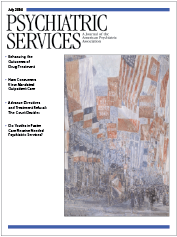Logical Fallacy?
To the Editor: In his interesting column on evidence-based treatments in the May issue, Dennis Morrison (10) gives us a clear example of a logical fallacy often seen in the evidence-based arena. Dr. Morrison states, "[T]he board of directors of CBH issued the following mandate, 'The Center will operate only those mental health treatments, services, and programs for which there exists evidence in the professional literature of their efficacy.' " Later in the piece, he begins a sentence as follows: "When the board … issued its directive that we provide only treatments that work … ." (Who wishes to provide treatments that don't work?) This is a shining example of the common error of interpreting "not proven effective" as "proven ineffective."
Dr. Puryear is in private practice in Santa Fe, New Mexico, and on the clinical faculty of the University of New Mexico Medical School.
1. Morrison D: Real-world use of evidence-based treatments in community behavioral health care. Psychiatric Services 55:485–487, 2004Link, Google Scholar



